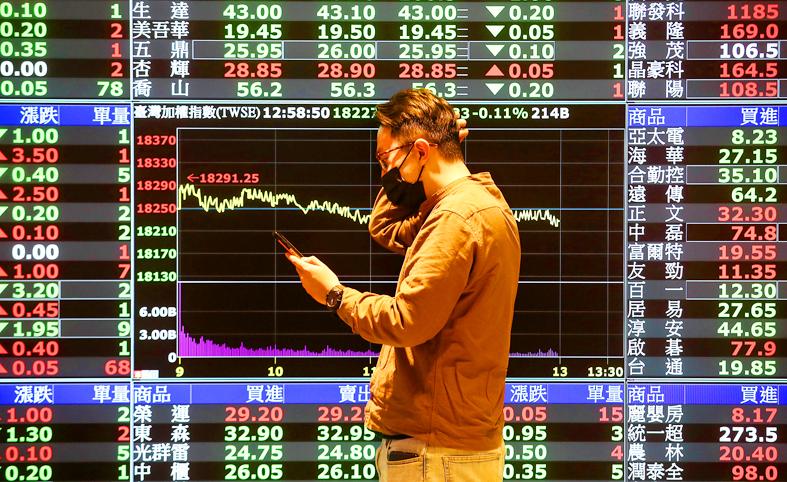The number of so-called “big investors” — those trading NT$500 million (US$17.13 million) or more in a single quarter — fell for a second consecutive quarter to 2,799 last quarter, the lowest number in the past five quarters, Taiwan Stock Exchange data showed.
Only 2,401 big investors were recorded in the fourth quarter of 2020.
The decline in big investors correlated with a 2.8 percent decline on the TAIEX. The index dropped from 18,218 at the end of last year to 17,693 at the end of last month amid Russia’s war in Ukraine and a net fund outflow of foreign investment, the data showed.

Photo: CNA
The number of “mid-sized investors” — those trading NT$100 million to NT$500 million in shares in a single quarter — plummeted 28 percent from a quarter earlier to 21,926 last quarter, also the lowest in the past five quarters, it showed.
In contrast, the number of retail investors — those trading less than NT$100 million in a quarter — rose 5 percent quarterly to 4.33 million, which was not only the highest in the past three quarters, but also the second-highest figure recorded in a single quarter after 4.39 million in the second quarter of last year.
The rise in the number of retail investors could be partly attributed to dollar-cost averaging (DCA) investments growing 53 percent quarterly to NT$6.51 billion, the data showed.
DCA, an investment strategy in which people periodically invest a fixed amount of money in a target asset regardless of fluctuations in the asset’s price, is safer for new investors and is thus becoming more popular among retail investors, the data showed.
Local individual investors accounted for 61.5 percent of the total turnover last quarter, down from 65 percent a quarter earlier, while foreign institutional investors made up 28.5 percent, up from 26 percent, the data showed.

In Italy’s storied gold-making hubs, jewelers are reworking their designs to trim gold content as they race to blunt the effect of record prices and appeal to shoppers watching their budgets. Gold prices hit a record high on Thursday, surging near US$5,600 an ounce, more than double a year ago as geopolitical concerns and jitters over trade pushed investors toward the safe-haven asset. The rally is putting undue pressure on small artisans as they face mounting demands from customers, including international brands, to produce cheaper items, from signature pieces to wedding rings, according to interviews with four independent jewelers in Italy’s main

Macronix International Co (旺宏), the world’s biggest NOR flash memory supplier, yesterday said it would spend NT$22 billion (US$699.1 million) on capacity expansion this year to increase its production of mid-to-low-density memory chips as the world’s major memorychip suppliers are phasing out the market. The company said its planned capital expenditures are about 11 times higher than the NT$1.8 billion it spent on new facilities and equipment last year. A majority of this year’s outlay would be allocated to step up capacity of multi-level cell (MLC) NAND flash memory chips, which are used in embedded multimedia cards (eMMC), a managed

Japanese Prime Minister Sanae Takaichi has talked up the benefits of a weaker yen in a campaign speech, adopting a tone at odds with her finance ministry, which has refused to rule out any options to counter excessive foreign exchange volatility. Takaichi later softened her stance, saying she did not have a preference for the yen’s direction. “People say the weak yen is bad right now, but for export industries, it’s a major opportunity,” Takaichi said on Saturday at a rally for Liberal Democratic Party candidate Daishiro Yamagiwa in Kanagawa Prefecture ahead of a snap election on Sunday. “Whether it’s selling food or

In the wake of strong global demand for AI applications, Taiwan’s export-oriented economy accelerated with the composite index of economic indicators flashing the first “red” light in December for one year, indicating the economy is in booming mode, the National Development Council (NDC) said yesterday. Moreover, the index of leading indicators, which gauges the potential state of the economy over the next six months, also moved higher in December amid growing optimism over the outlook, the NDC said. In December, the index of economic indicators rose one point from a month earlier to 38, at the lower end of the “red” light.